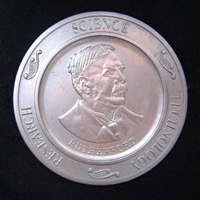|
Medals
Rutherford Medal - Royal Society of New Zealand - 1991

|
The Rutherford Medal was inaugurated by the Royal
Society of New Zealand in 1991. It is awarded annually to a scientist of distinction who
will stand in high public esteem through research work of international significance.
To save time and money, the die was engraved using for the obverse the master used for the
RSNZ's Rutherford Centennial Commemorative Medal of 1971. This is a pity as once again we
present Ern as an old man. The medals were cast in silver and bronze. Though designed to
be called the Rutherford Medal, all categories were actually awarded as New Zealand
Science and Technology Medals. Approximately 20 bronze medals are awarded each year for
contributions to science and technology and for presenting science to the public. When the
DSIR was broken up into various Crown Research Institutes these bronze medals also took
over the role of the old Director's Award for DSIR staff. A silver medal was awarded once
or twice a year for good science or for outstanding support of science.
The Rutherford Medal is a gold plated New Zealand Science and Technology
Silver Medal. In 2000 the RSNZ formally applied to the Rutherford family to once again
call the gold medal the Rutherford Medal. This was granted because it is the RSNZ's most
prestigious award. By 2011 it also carried a monetary prize of NZ$100,000.
1991 Vaughan Jones, for his contributions to String Theory.
1992 The Department of Scientific and Industrial Research.
1993 Roy Kerr, for his contribution to relativity through the Kerr metric.
1994 Ian Axford for his leadership in international science.
1995 William Denny, for his sustained innovation in developing new anticancer drugs.
1996 Not Awarded
1997 John Walker, for his lifetime contribution to soil science.
1998 Bill Robinson, for his development of energy absorbers for earthquake protection of
civil structures.
1999 David Vere-Jones, for his contributions to statistics.
2000 Alan MacDiarmid, for his discovery and development of conducting polymers.
2001 Peter Gluckman.
2002 Jeff Tallon, for his contribution to high temperature superconductors.
2003 George Petersen, for his exceptional contribution in pioneering methods for sequencing DNA.
2004 David Penny, for his distinguished contributions in theoretical biology.
2005 Paul Callaghan, for world-leading research in development of new Nuclear Magnetic Resonance (NMR) methods.
2006 Ted Baker, for his internationally recognised and pioneering work in structural biology.
2007 Richard Faull, for his ground-breaking work in understanding the human brain.
2008 David Parry, for his world-leading research on fibrous proteins.
2009 Peter Hunter, for his revolutionary approach to modelling the human body.
2010 Warren Tate, for his outstanding achievements in molecular biology and molecular neuroscience.
2011 Christine Winterbourn, for her outstanding achievements and discoveries in free radical biology.
Further details, including more recent awardees, may be found in the Medals section of www.royalsociety.org.nz
|
Rutherford Memorial Medal - Royal Society of Canada - 1980

|
The Royal Society of Canada awards two Rutherford
Memorial Medals each year, for outstanding research, in physics and in chemistry, carried
out in Canada. Preference is given to those under 40 years of age, in recognition of
Rutherford's own researches carried out in Canada at a relatively young age.
These awards, consisting of a gold-plated silver medal and a cash amount of C$2500, were
inaugurated by the Royal Society of Canada in 1980 to replace the Rutherford Memorial
Scholarship which was founded in 1952. Further details, including past awardees, may be
found in the Medals and Awards section of www.rsc.ca . |
Rutherford Medal and Prize - Institute of Physics (UK) - 1966

|
The Physical Society instituted the Rutherford
Memorial Lecture in 1939. Owing to the outbreak of war, the first lecture was not given
until 1942. This was changed to a Medal and Prize from 1966. The Award is
made in even dated years for contributions to nuclear physics, elementary particle physics
or nuclear technology. The medal is bronze and the prize is 1000 British pounds. The
Medallist may be invited to give a plenary lecture at an appropriate conference. Further
details, including past winners, may be found in the Awards section of www.iop.org . |
Rutherford Medallion - Hungary - 2005

|
This award was initiated by László Kovács, the Head of
Department who taught nuclear physics, history of physics and physics teachers, at the Teachers College,
Szombathely, Hungary.
He holds Rutherford in high regard.
The medallion was designed in 2005 by Csaba Barták, then an arts student at the college, and five were cast.
The medallions were presented to old students who excelled in teaching physics, and have been awarded
to Prof. Dr. Károly Gadányi (2005), Prof. Dr. István Jankovics (2005), and László Szelecz (2007).
László Kovács has since retired, and it appears that no more awards will be made.
|
Rutherford Commemorative Medallion - Russia - 1971

|
Peter Kapitza was a fan of Rutherford and Rutherford was elected a corresponding member in 02/12/22, and
an honorary member in 3/1/25.
The next NZ educated person elected a Fellow was probably physicist Neil Ashcroft of Cornell University in 2008.
The Russian Academy of Sciences struck this Commemorative medallion
to mark the centennial of Rutherford's birth, along with a commemorative postal stamp. (It was the latter that shamed NZ
into belatedly producing its own commemorative stamps. See the story under the 1c NZ stamp.)
The medallion was designed by XX and XX were cast in bronze. Each came in a red material-covered
presentation box.
|
Rutherford Commemorative Medallion - Royal Society of New Zealand - 1971

|
This commemorative medallion was issued in August 1971 by the Royal Society of New Zealand to mark the
centennial of Rutherford's birth.
Manufactured by the Franklin Mint, it is golden hue (bronze, proof finish) sealed in plastic film in a
green information card.
The reverse side has the Coats of Arms of (clockwise) Canterbury, Cambridge, Manchchester and McGill
Universities.
|
|







